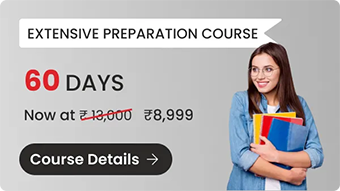• IELTS
IELTS Reading Practice Tests 2025: Reading Passage and Sample Questions
13496 Reads
3 min Read
This blog discusses the Reading module for the Academic and General Training version of the IELTS Exam. Then, it moves on to talk about a sample reading passage and questions that might appear in the IELTS examination.
The IELTS or International English Language Testing System exam consists of four modules – Reading, Writing, Speaking and Listening. The IELTS Reading module’s format varies depending on whether it is the Academic or General Training version of the exam. The format varies as follows:
| The Academic Version | The Academic version of the IELTS exam’s Reading module consists of three long passages. These passages are about 800-900 words long and are taken from Academic Journals, Magazines, Newspapers etc. |
| The General Training Version | The General Training version of the exam consists of five passages in its Reading module. Out of these five passages, four passages are short while the last one is a long passage. The shorter passages are about 400-500 words long while the longer passage is about 800-900 words in length. The short passages are about daily life situations while the long passage is an academic one. |
IELTS Academic Reading Practice Test
Certain considerations, which are listed below, must be made while taking the academic reading practice test:
- The Academic Reading examination lasts for 60 minutes.
- Each of the three sections will include a lengthy text that is up to 2,150–2,750 words in length.
- The readings for the exam are drawn from periodicals, newspapers, and magazines. These subjects are presented to audiences who are not specialists and will find them of general interest.
- The texts or excerpts provided are pertinent or to the point and are aimed toward students enrolled in undergraduate or graduate programs as well as those pursuing professional registration in other nations, such as becoming a teacher, doctor, or other licensed professional.
- You might be asked questions that are factual, discursive, descriptive, or analytical based on the text provided.
- Graphs, tables, pictures, and other non-verbal items may be included with the text that is provided.
- If there is any jargon in the text, a specific vocabulary is provided.
- On the basis of the provided text, there are several question types available, including multiple-choice, matching facts, matching sentences, flow chart completion, table completion, and others.
- There will be 40 questions and 1 mark will be awarded for each correct response. Scores out of 40 are divided into 9 bands, which are presented as full or half bands.
Also read: Syllabus for IELTS
IELTS General Training Reading Practice test
The IELTS General Training Reading Practice Test will aid in time management and give you a general picture of what to expect on the real test. The following are some of the steps to be followed when taking these tests:
- A specific topic will be provided for you to read and respond to during the General Training Reading Test, which will likewise last 60 minutes.
- There will be three portions in the general training as well, and each section will cover a different subject.
- There will be two to three factual sections in section 1 that are drawn from daily life.
- Two factual texts centered on workplace-related topics will be included in section 2.
- A more complicated paragraph on general subjects will be in Section 3.
- The topic will be sourced from publications like newspapers, periodicals, and journals.
- There will be a variety of question kinds, including matching information, sentence completion, flowchart completion, graph completion, table completion, and others.
- Each portion will contain 40 questions. Each question will be worth 1 mark, which is then divided into 9 bands. The bands may be full or half bands.
Also read: Overview of IELTS
IELTS Reading Sample Passage and Questions
You should spend about 20 minutes on Questions 1-13, which are based on Reading Passage 1 below.
The Creativity Myth
A. It is a myth that creative people are born with their talents: gifts from God or nature. Creative genius is, in fact, latent within many of us, without our realizing. But how far do we need to travel to find the path to creativity? For many people, a long way. In our everyday lives, we have to perform many acts out of habit to survive, like opening the door, shaving, getting dressed, walking to work, and so on. If this were not the case, we would, in all probability, become mentally unhinged. So strongly ingrained are our habits, though this varies from person to person, that sometimes when a conscious effort is made to be creative, automatic response takes over. We may try, for example, to walk to work following a different route, but end up on our usual path. By then it is too late to go back and change our minds. Another day, perhaps. The same applies to all other areas of our lives. When we are solving problems, for example, we may seek different answers, but, often as not, find ourselves walking along the same well-trodden paths.
B. So, for many people, their actions and behavior are set in immovable blocks, their minds clogged with the cholesterol of habitual actions, preventing them from operating freely, and thereby stifling creation. Unfortunately, mankind’s very struggle for survival has become a tyranny – the obsessive desire to give order to the world is a case in point. Witness people’s attitude to time, social customs and the panoply of rules and regulations by which the human mind is now circumscribed.
C. The groundwork for keeping creative ability in check begins at school. School, later university and then work, teach us to regulate our lives, imposing a continuous process of restrictions which is increasing exponentially with the advancement of technology. Is it surprising then that creative ability appears to be so rare? It is trapped in the prison that we have erected. Yet, even here in this hostile environment, the foundations for creativity are being laid; because setting off on the creative path is also partly about using rules and regulations. Such limitations are needed so that once they are learned, they can be broken.
Also read: Eligibility criteria for IELTS
D. The truly creative mind is often seen as totally free and unfettered. But a better image is of a mind, which can be free when it wants, and one that recognizes that rules and regulations are parameters, or barriers, to be raised and dropped again at will. An example of how the human mind can be trained to be creative might help here. People’s minds are just like tense muscles that need to be freed up and the potential unlocked. One strategy is to erect artificial barriers or hurdles in solving a problem. As a form of stimulation, the participants in the task can be forbidden to use particular solutions or to follow certain lines of thought to solve a problem. In this way, they are obliged to explore unfamiliar territory, which may lead to some startling discoveries. Unfortunately, the difficulty in this exercise, and with creation itself, is convincing people that creation is possible, shrouded as it is in so much myth and legend. There is also an element of fear involved, however subliminal, as deviating from the safety of one’s thought patterns is very much akin to madness. But, open Pandora’s box and a whole new world unfold before your very eyes.
E. Lifting barriers into place also plays a major part in helping the mind to control ideas rather than letting them collide at random. Parameters act as containers for ideas and thus help the mind to fix on them. When the mind is thinking laterally and two ideas from different areas of the brain come or are brought together, they form a new idea, just like atoms floating around and then forming a molecule. Once the idea has been formed, it needs to be contained or it will fly away, so fleeting is its passage. The mind needs to hold it in place for a time so that it can recognize it or call on it again. And then the parameters can act as channels along which the ideas can flow, developing and expanding. When the mind has brought the idea to fruition by thinking it through to its final conclusion, the parameters can be brought down and the idea allowed to float off and come in contact with other ideas.
Also read: IELTS Exam type
Questions 1-5
Reading Passage 1 has five paragraphs, A-E.
Which paragraph contains the following information?
Write the correct letter A-E in boxes 1-5 on your answer sheet.
NB You may use any letter more than once.
1. the way parameters in the mind help people to be creative
2. the need to learn rules in order to break them
3. how habits restrict us and limit creativity
4. how to train the mind to be creative
5. how the mind is trapped by the desire for order
Questions 6-10
Choose the correct letter, A, B, C or D.
6. According to the writer, creative people
A. are usually born with their talents
B. are born with their talents
C. are not born with their talents
D. are geniuses
7. According to the writer, creativity is
A. a gift from God or nature
B. an automatic response
C. difficult for many people to achieve
D. a well-trodden path
8. According to the writer
A. the human race’s fight to live is becoming a tyranny
B. the human brain is blocked with cholesterol
C. the human race is now circumscribed by talents
D. the human race’s fight to survive stifles the creative ability
9. Advancing technology
A. holds creativity in check
B. improves creativity
C. enhances creativity
D. is a tyranny
10. According to the author, creativity
A. is common
B. is increasingly common
C. is becoming rarer and rarer
D. is a rare commodity
Questions 11-14
Do the following statements reflect the claims of the writer?
In boxes 11-14 on your answer sheet write
YES, if the statement agrees with the information in the passage
NO, if the statement contradicts the information in the passage
NOT GIVEN, if there is no information about the statement in the passage
11. Rules and regulations are examples of parameters.
12. The truly creative mind is associated with the need for free
speech and a totally free society.
13. One problem with creativity is that people think it is impossible.
14. The act of creation is linked to madness.
Also read : IELTS Exam dates
FAQ
Get great articles direct to your inbox
The latest news, articles, and resources, sent straight to your inbox every month.
Popular Universities to Study Abroad
World class education waiting for you.

Dimensions International College - Main Campus
North Region, Singapore • 35 Programmes
Tuition Fee : SGD 0-0 / year

.png)
Shorelight Group - Carroll University
Wisconsin, USA • 52 Programmes
Tuition Fee : USD 39000-40000 / year

Auckland University of Technology - South Campus
Auckland, New Zealand • 35 Programmes
Tuition Fee : NZD 30092-42831 / year

Global University Systems (GUS) - The University of Law - Birmingham Campus
England, UK • 32 Programmes
Tuition Fee : GBP 11000-17000 / year

Great Plains College - Swift Current Campus
Saskatchewan, Canada • 5 Programmes
Tuition Fee : CAD 17000-17500 / year

University for the Creative Arts - Epsom Campus
England, UK • 60 Programmes
Tuition Fee : GBP 16000-17000 / year
.png)
Popular English Language Proficiency Exams
IELTS Online
- Live Classes
Blogs and Articles
Curated content to keep you updated on the latest education trends, news and more.
Updated on • Jul 17,2025 05:33 PM IST • USA
PTE Accepted Universities in Australia
Updated on • Jul 17,2025 05:09 PM IST • PTE
Part-Time Jobs for International Students in Australia
Updated on • Jul 17,2025 03:44 PM IST • Australia
Updated on • Jul 12,2025 04:02 PM IST • USA
Updated on • Jul 11,2025 11:32 AM IST • Education
CPT vs OPT: Meaning, Difference, and How to Apply
Updated on • Jul 11,2025 10:40 AM IST • USA
Masters in Computer Science in UK: Top Colleges, Eligibility, Scholarships
Updated on • Jul 10,2025 11:29 AM IST • study in the UK
Highest Paying Jobs in the World
Updated on • Jul 08,2025 01:40 PM IST • Study Abroad
MBA in Australia for Indian Students: Best Universities, Requirements, Scholarship, Courses, Jobs
Updated on • Jul 08,2025 01:35 PM IST • Australia
Canada vs Australia: Which Country is Better for Indian Students in 2025?
Updated on • Jul 07,2025 12:46 PM IST • Education
France vs Germany: Which Is Better for International Students?
Updated on • Jun 30,2025 05:15 PM IST • Education
Top 10 Agricultural Universities in USA
Updated on • Jun 27,2025 05:25 PM IST • USA
Most In-Demand Future Careers in 2025
Updated on • Jun 26,2025 04:41 PM IST • Education
How Much Do Nurses Make in the U.S.?
Updated on • Jun 23,2025 03:59 PM IST • USA
Updated on • Jun 21,2025 02:00 PM IST • USA
MBA in UK: Universities, Eligibility, Types, and Career Opportunities
Updated on • Jun 19,2025 04:09 PM IST • UK • study in the UK
Scholarships in France for Indian Students
Updated on • May 29,2025 05:22 PM IST • France
Intakes in Dubai for Indian Students
Updated on • May 27,2025 03:34 PM IST • Study in Dubai
France Student Visa 2025 – Requirements, Fees, Checklist & Application Process
Updated on • May 23,2025 03:36 PM IST • France
MBA in France for Indian Students in 2025
Updated on • May 22,2025 05:35 PM IST • France
Related Blogs and Articles
A little effort to provide an authentic and reliable content for keen readers!!
Updated on • 11-04-2025 • IELTS
Describe Your Hometown IELTS Speaking Part 1 Topic
Updated on • 07-04-2025 • IELTS
PTE vs IELTS : Know the Difference and Which is Easier?
Updated on • 21-03-2025 • IELTS
IELTS Exam Dates 2025 in India
Updated on • 18-01-2025 • IELTS
IELTS Letter Writing Topics 2025
Updated on • 15-01-2025 • IELTS
Canada IELTS band requirements 2025
Updated on • 10-01-2025 • IELTS
Updated on • 25-11-2024 • IELTS
Updated on • 21-11-2024 • IELTS
Updated on • 02-11-2024 • IELTS
Linking Words for IELTS Speaking - Word List & Tips
Updated on • 25-10-2024 • IELTS
IELTS Writing Task 2 - Academic and General Topics with Sample Answer
Updated on • 25-10-2024 • IELTS
IELTS Writing Task 2: Tips, Lessons & Models
Updated on • 25-10-2024 • IELTS
IELTS Test Report Form (TRF): Number, Tracking, Validity and Sample
Updated on • 25-10-2024 • IELTS
IELTS Speaking Samples and Answers
Updated on • 25-10-2024 • IELTS
Updated on • 25-10-2024 • IELTS
Updated on • 25-10-2024 • IELTS
IELTS Sample Charts for Writing Task 1 Practice
Updated on • 25-10-2024 • IELTS
IELTS GT Writing Task 1/ IELTS Letter Writing
Updated on • 25-10-2024 • IELTS
Updated on • 25-10-2024 • IELTS
How many times is the IELTS exam conducted in a year?
Updated on • 25-10-2024 • IELTS














